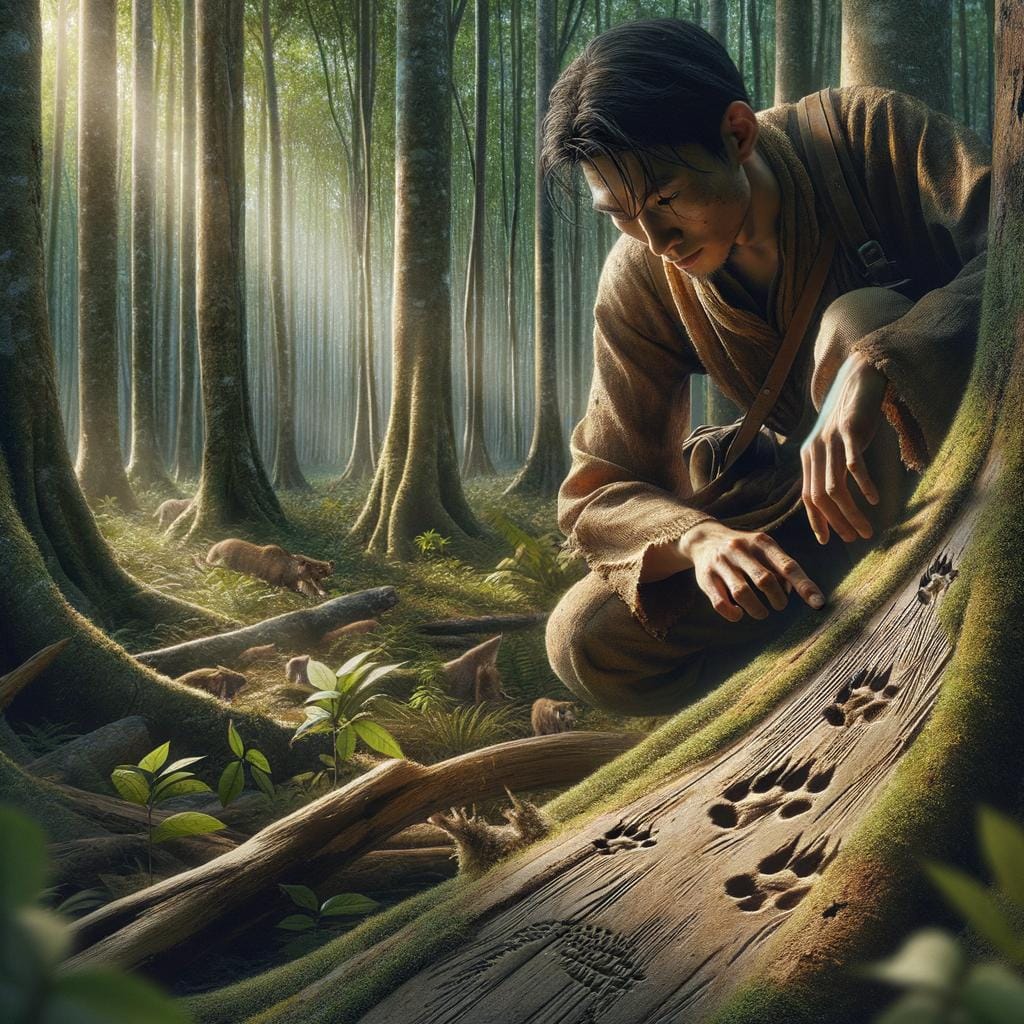Tracking skills are essential abilities that allow individuals to follow the trail or path left by a person, animal, or object. These skills involve observation, reasoning, and critical thinking to decipher clues and make sense of patterns. Whether it’s tracking wildlife in the wilderness, navigating through challenging terrain, or tracing digital footprints online, mastering tracking skills can be invaluable in various aspects of life.
Throughout history, tracking has played a crucial role in survival and success. From ancient hunting techniques used by early humans to modern-day applications in law enforcement and cybersecurity, tracking skills have evolved and adapted to meet the changing needs of society. The ability to track efficiently has been instrumental in tasks like search and rescue operations, criminal investigations, and wildlife conservation efforts.
Understanding the different types of tracking skills is key to honing this ability. Whether it’s animal tracking in the great outdoors, navigating through unfamiliar territory, or monitoring online activities for cybersecurity purposes, each type requires specific knowledge and expertise. By delving into the science behind tracking and learning how it works, individuals can develop a deeper understanding of what makes someone proficient at tracking and how they can improve their own skills over time.
The History of Tracking
Tracking skills have a long and rich history, dating back to ancient times when they were essential for survival. From hunting for food to navigating through unfamiliar terrain, tracking has been an integral part of human existence. Ancient civilizations relied on tracking to hunt game for sustenance and track the movement of rival tribes. As societies evolved, so did the applications of tracking skills.
Throughout history, various cultures developed their own methods of tracking based on their surroundings and available resources. For example, Native American tribes honed their animal tracking skills to locate prey and avoid danger in the wilderness. In Africa, indigenous trackers utilized subtle signs in the environment to follow the trails of animals or enemies with precision. These early tracking techniques laid the foundation for modern day applications across multiple fields.
In today’s world, tracking skills have expanded far beyond hunting and navigation. They now play a crucial role in disciplines such as cyber security, forensic science, and wildlife conservation. Professionals in these fields rely on advanced tracking methods to trace digital footprints, analyze crime scenes, and monitor endangered species. The evolution of tracking from ancient hunting techniques to contemporary applications underscores its enduring importance in various aspects of society.
Types of Tracking Skills
Tracking skills encompass a wide range of abilities that can be applied to various fields and situations. From ancient hunting techniques to modern-day cyber security tracking, these skills have evolved and adapted over time. Let’s explore the different types of tracking skills that individuals can develop and utilize in today’s world:
- Animal Tracking: One of the oldest forms of tracking, animal tracking involves observing and interpreting signs left behind by animals in their natural habitat. This skill is often used by wildlife biologists, researchers, and outdoor enthusiasts to study animal behavior and movements.
- Outdoor Navigation: Outdoor navigation tracking skills are essential for hikers, campers, and adventurers who need to navigate through unfamiliar terrain. These skills involve using maps, compasses, GPS devices, and natural landmarks to stay oriented and reach destinations safely.
- Cyber Security Tracking: In the digital age, cyber security tracking skills are crucial for identifying and thwarting cyber threats such as malware, phishing attacks, and data breaches. Professionals in the field of cybersecurity use advanced tools and techniques to track malicious activities online.
Developing proficiency in these diverse types of tracking skills requires a combination of knowledge, experience, and practice. While each type of tracking skill has its own unique set of challenges and nuances, they all share the common goal of gathering information, interpreting data, and making informed decisions based on observations.
Whether you’re studying animal behavior in the wilderness, navigating through rugged terrain, or defending against cyber threats online, honing your tracking skills can greatly enhance your ability to handle complex situations effectively. By continuously learning new techniques, practicing regularly, and seeking opportunities for improvement, you can become proficient in various types of tracking skills and apply them confidently in real-world scenarios.
The Science Behind Tracking
Tracking skills involve a combination of observation, deduction, and analysis to follow a trail or trace left behind by a person, animal, or object. The science behind tracking is rooted in the understanding of how different factors can affect the evidence left at a particular location. For example, a skilled tracker can analyze the depth of footprints, the disturbance of vegetation, and even the smell lingering in the air to determine when and where the subject passed through.
To be proficient in tracking skills, individuals must possess keen observation abilities and attention to detail. This means being able to notice subtle differences in the environment, such as broken branches or disturbed soil, that may indicate someone has passed through an area. Additionally, good tracking skills require critical thinking and problem-solving capabilities to piece together the evidence left behind and make accurate deductions about what transpired.
Furthermore, environmental knowledge plays a key role in developing tracking skills. Understanding how different terrains can impact tracks or traces left behind is essential for accurate interpretation. Factors like weather conditions, time elapsed since passing through an area, and the type of terrain all affect how evidence presents itself. By honing these skills through practice and training, individuals can become proficient trackers across various settings and scenarios.
| Tracking Skill | Description |
|---|---|
| Observation | Keen attention to detail to notice subtle differences in the environment. |
| Critical Thinking | Ability to analyze evidence and make accurate deductions. |
| Environmental Knowledge | Understanding how different terrains and conditions impact tracks or traces. |
Developing Tracking Skills
Practice Observation and Awareness
One of the key components of tracking skills is being observant and aware of your surroundings. Train yourself to notice subtle details such as footprints, broken twigs, or changes in the environment that may indicate someone or something has passed through. Practicing mindfulness exercises can also help sharpen your senses and improve your ability to notice patterns and anomalies.
Learn From Experts
Seek out opportunities to learn from experienced trackers who can provide valuable insights and guidance. Joining tracking workshops, enrolling in courses led by seasoned professionals, or even participating in guided tracking expeditions can offer practical hands-on experience and knowledge that you won’t find in books or online resources. Additionally, learning from experts allows you to receive personalized feedback and tailored advice on how to enhance your tracking skills effectively.
Utilize Technology as a Training Tool
In today’s digital age, technology has transformed the way we approach tracking skills. Incorporate the use of GPS devices, smartphone apps, drones, or other tools that can help you practice and refine your tracking abilities. These technological resources can provide real-time feedback, data analysis, and interactive simulations to simulate various tracking scenarios. By leveraging technology as a training tool, you can supplement traditional methods with innovative approaches to further enhance your tracking skills development.
Real-Life Applications of Tracking Skills
Tracking skills play a crucial role in various real-life applications, including search and rescue operations, criminal investigations, and wildlife conservation. In search and rescue operations, these skills are utilized to follow trails left by missing individuals or lost hikers.
Trained professionals use tracking techniques to determine the direction of travel, identify potential hazards along the way, and ultimately locate those in need of assistance. The ability to interpret signs like footprints, broken twigs, or disturbed vegetation is essential in successfully conducting search and rescue missions.
In criminal investigations, tracking skills are instrumental in gathering evidence, identifying suspects, and reconstructing events leading up to a crime. Law enforcement agencies often rely on forensic tracking experts to analyze physical evidence left at crime scenes.
By utilizing their expertise in recognizing patterns and interpreting clues, these professionals can piece together a timeline of events and help solve cases. Whether it’s analyzing tire tracks at a hit-and-run scene or tracing the movements of a suspect through security camera footage, tracking skills are invaluable in criminal investigations.
Wildlife conservation efforts also benefit greatly from tracking skills. Researchers studying animal behavior use tracking techniques to monitor populations, study migration patterns, and assess the impact of human activities on different species. By closely observing signs like scat, feeding habits, or territorial markings left by animals in their natural habitats, scientists can gather valuable data for conservation purposes. Tracking skills are essential for preserving biodiversity and developing effective strategies to protect endangered species from extinction.
| Real-Life Application | Example |
|---|---|
| Search and Rescue Operations | Tracking footprints to locate missing hikers |
| Criminal Investigations | Analyzing tire tracks at a crime scene |
| Wildlife Conservation | Monitoring animal populations through tracking techniques |
Tracking Skills in Everyday Life
Tracking skills are not just crucial in specialized fields like search and rescue operations or criminal investigations; they also play a vital role in our everyday lives. Developing and honing tracking skills can significantly improve problem-solving and decision-making abilities, helping individuals navigate various challenges they encounter.
Problem-Solving
One of the key benefits of tracking skills in everyday life is their contribution to effective problem-solving. By understanding how to analyze patterns, interpret information, and draw logical conclusions, individuals with strong tracking skills can approach problems methodically and strategically. Whether it’s figuring out a complex work issue, managing personal finances, or resolving conflicts in relationships, the ability to track relevant details and connect dots is essential for finding successful solutions.
Decision-Making
In addition to problem-solving, tracking skills also play a pivotal role in decision-making processes. Being able to gather pertinent data, evaluate alternatives, anticipate potential outcomes, and assess risks accurately are all components of effective decision-making that rely on tracking abilities. Whether it’s making career choices, financial investments, or lifestyle changes, individuals who possess strong tracking skills are better equipped to make sound decisions that align with their goals and values.
Everyday Applications
From planning daily schedules efficiently to organizing tasks effectively, tracking skills can be applied in numerous aspects of everyday life. Whether it’s keeping track of deadlines at work, monitoring progress towards personal goals, or analyzing trends in various areas of interest, the ability to track information systematically enhances productivity and performance. By recognizing patterns, identifying trends, and making informed decisions based on data analysis, individuals can optimize their actions and achieve greater success in their endeavors.
Tracking Skills in the Digital Age
As we progress further into the digital age, technology continues to revolutionize the way we track and monitor various aspects of our lives. Tracking skills have significantly evolved with the advancement of technology, offering a more efficient and comprehensive approach to monitoring. From GPS tracking devices to sophisticated data analytics tools, modern technology has transformed the way we track and gather information.
One key area where technology has made a significant impact is in cyber security tracking. With the rise of online threats and digital crimes, organizations rely on advanced tracking tools to monitor and analyze network activities for any potential risks or breaches.
These tools not only help in identifying security vulnerabilities but also play a crucial role in preventing cyber attacks before they cause any harm. Developing strong tracking skills in the digital realm is essential for protecting sensitive information and maintaining cybersecurity protocols.
Moreover, technology has also reshaped outdoor navigation through innovations like satellite mapping systems and GPS-enabled devices. Outdoor enthusiasts no longer have to rely solely on traditional navigation methods but can now utilize precise location tracking tools to plan routes, track movements, and stay safe during their adventures.
These advancements not only enhance safety but also provide a more enjoyable outdoor experience for individuals with varying levels of tracking skills. In essence, technology has made tracking more accessible, accurate, and integrated into our daily lives than ever before.
Enhancing Tracking Skills
In conclusion, tracking skills are essential abilities that span various fields and disciplines, from ancient hunting techniques to modern cyber security tracking. The ability to track effectively can make a significant difference in search and rescue operations, criminal investigations, wildlife conservation efforts, and even everyday decision-making processes. By understanding the science behind tracking and continuously developing these skills, individuals can enhance their problem-solving capabilities and navigate through complex situations with ease.
Continuous learning, practice, and improvement strategies are key to enhancing tracking skills. Whether it be honing animal tracking abilities in the wilderness or mastering digital tracking tools in the cyber realm, consistent training and exposure to different environments can help individuals become more proficient trackers. It is important to stay up-to-date with new technologies and methodologies in tracking to adapt to ever-evolving challenges and scenarios.
Ultimately, by focusing on improving their tracking skills through dedication and perseverance, individuals can become adept at interpreting signs and patterns within their surroundings. This not only enhances their ability to navigate physical landscapes but also equips them with valuable insights that can be applied across various facets of life. As technology continues to advance, the importance of honing one’s tracking skills remains relevant in both traditional settings and the rapidly changing digital age.
Frequently Asked Questions
How Do I Become a Good Tracker?
Becoming a good tracker requires a keen observation of the environment, understanding animal behavior, and interpreting tracks and signs left behind. It involves honing skills in identifying footprints, gait patterns, droppings, markings, and disturbances in the natural surroundings.
What Is the Meaning of Tracking Signs?
Tracking signs refer to physical evidence left behind by animals as they move through their environment. These signs can include footprints, fur caught on branches, broken twigs or foliage, scent markers, droppings, feathers, scratches on trees, and disturbed soil. Mastering the interpretation of these signs is crucial for tracking animals effectively.
What Is the Tracking Skill in the Hunter?
Tracking skill is essential for hunters as it allows them to locate and follow game animals for hunting purposes. A skilled tracker can determine the direction of travel, estimate the size and age of tracks, recognize different species based on their prints, and anticipate animal behavior based on the signs observed in their surroundings.
This skill increases the chances of a successful hunt while also deepening a hunter’s connection to nature.

An avid outdoor enthusiast, writer, and environmental advocate who has spent over two decades exploring the world’s most breathtaking landscapes. With a background in environmental science and a passion for adventure, Frances combines her love for nature with her talent for storytelling to inspire others to embark on their own outdoor journeys.





